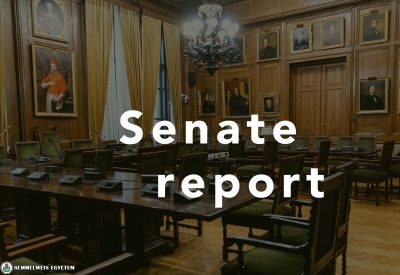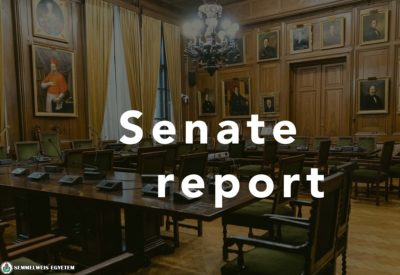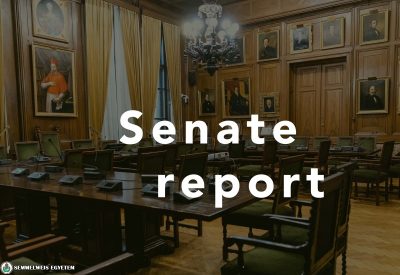A decision was taken to amend the Organizational and Operational Rules (SZMSZ). In this context:
- the rules of the scholarship from own resources have been changed, to include students who participate in a course abroad organized by a professional organization, and the scholarship will also be available as an additional subsidy.
- the Semmelweis University B52 Limited Liability Company has been included, with Semmelweis University acquiring 100% of the shares.
- transitional provisions have been introduced to clarify the rules on academic obligations of the Doctoral Regulations, which were adopted by the Senate at its May meeting and have been in force since 3 June, in order to apply them in the ascending system.
- the internal organizational structure of the Directorate General of Human Resources has been also modified.
The Senate also decided to amend certain provisions of the Organizational and Operational Rules concerning the employment requirements. Pursuant to the amendment, only those who have obtained a doctorate and meet the other conditions may be appointed as assistant professors for an indefinite period. Assistant professors who do not hold a doctorate may be appointed for an indefinite period of two years, renewable for a further three years. The aim of this provision is to motivate the early acquisition of degrees and to increase the number of qualified teachers.
The proposal on the regulation of teleworking was adopted, according to which remote working can be carried out in individual cases, with the prior permission of the Rector, the Chancellor or the President of the Clinical Centre, it must be specified in the employment contract, its justification must be reviewed annually and the employer may terminate it at any time by unilateral action. The employment contract shall stipulate that during teleworking the employee must be available during working hours and work under appropriate working conditions. The aim of the regulation is to ensure that the home office is applied according to uniform principles within the university.
The Senate has discussed and decided on the amendment of certain provisions of the Remuneration and Benefits Regulation related to reclassification. Accordingly, the weighted grade point average for the transfer to self-financed courses is 2.5 for the academic year 2021/2022 and 2022/2023, which means more favorable conditions for students.
The Senate approved the proposal to amend the rules of procedure of the Clinical Centre. This transfers the previous Senate decisions to the rules of procedure of the Clinical Centre.
Amendments to the regulations on clinical trials were also adopted. Under the new regulation, the Directorate of Health Management and Development, under the Directorate General for Medical Sciences, will be responsible for the coordination of clinical trials at the University. Under the change, a block coordinator role has been defined and Semmelweis Health Ltd. may be given the opportunity to enter as a contributor by providing services related to the trials. The procedures for preparing, commenting and signing the contract were clarified, maintaining the good practice of the past. The requirement to record data in real time in MedSol has been introduced. Among other things, the clinics’ share has been changed (increased) regarding the fees of the trials, and the contracting rates have also been modified.
A decision was taken to amend the curriculum of the medical education at the Faculty of Medicine (ÁOK), introducing three compulsory optional subjects: disaster medicine was reinstated in the curriculum, as well as medical terminology and Hungarian medical language. A decision has also been made on the subject requirements of the ÁOK for the 2022/2023 academic year, which includes the details of the implementation of the curriculum.
The Senate approved the new syllabus of the Faculty of Pharmacy (GYTK) to be introduced in the academic year 2022/2023, as well as the proposal to amend the existing model syllabus. The new model curriculum was justified by the modification of the qualification and outcome requirements, as well as the study and examination regulations. In addition, the experiences of the curriculum reform and student feedback were taken into account. The changes mainly concern the distribution of the teaching load and aim to reduce drop-out rates. To this end, the formerly elective subject “Physical fundamentals of biophysics” will now be made compulsory in the 1st semester; the six-month internship before the final exam can be completed in public and hospital pharmacies; and the theoretical and practical courses in one subject will be merged and made single-subject.
A decision has been taken to change the four training supervisors at the Institute of Mental Health at the Faculty of Health and Public Administration.
The Senate adopted the Employee Regulations. The amendment of the regulations was justified by the new Employee Council established in January 2022, and by the change in the legal status of university citizens and the change of model.
According to the Senate’s decision, a new elective course will be launched under the name Health and Science Communication I-II. The two-semester course, which will be taught in Hungarian, will serve to establish and integrate science communication training into the university’s educational system, thus ensuring that university results are communicated in a way that is understandable to the lay public and that also strengthens the institution’s position in the society. The aim of the subject is to make basic information on science communication available and accessible to the widest possible range of students.
The board approved the nominations for the 2023 state and ministerial level awards, and also commented on a current application for a lecturer.
Ádám Szabó
Translation: Gábor Kiss


